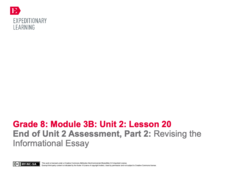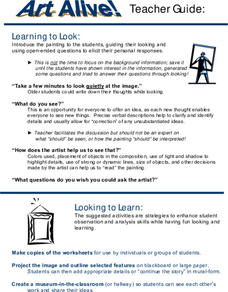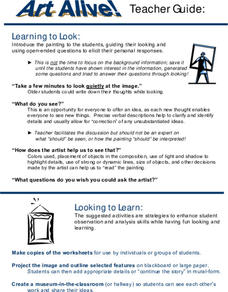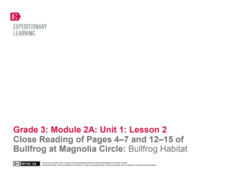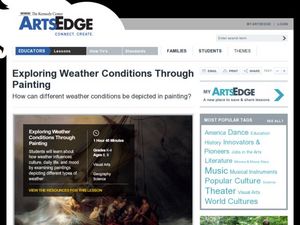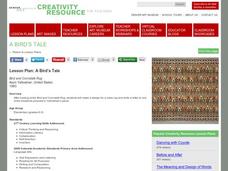Curated OER
Identifying Personification in Poetry
Improve your young poets' descriptive writing with this lesson on personification. A SMART board and PowerPoint presentation guide your class through the process of identifying human qualities attributed to various non-human objects. A...
Curated OER
Comprehension: Identify Cause and Effect Relationships in Text
Third graders and their teacher work together to understand cause and effect relationships in texts. The I do, we do, you do method is used as learners discuss and determine the cause and effect relationships found in several short...
Curated OER
Identifying and Generating Rhyming Words, Body
Can you tell which words rhyme? Choose a body part as a starting word (i.e. head) and begin saying words to see if learners can identify those that rhyme. Does red rhyme with head? Continue giving examples, some...
K12 Reader
Identifying Adverbs
Work on adverbs and adverbial phrases with a grammar worksheet. After reading 15 sentences with adverbs, learners circle the adverbs and adverbial phrases and note what question they are answering (when, how, where, and how much).
Curated OER
Language Arts: Ode to the Ordinary
Eighth graders select ordinary objects, determine their uses, and write poems about them. Once they select an object, they create a web about its uses to serve as an outline. Once they have written their own odes, 8th graders meet in...
Curated OER
Telling Stories: Symbols of a Life
Art and literature can go hand in hand, they both are used to express elements of the self in a creative and interesting way. Budding story tellers interpret and analyze the narrative elements they find in a work of art. They focus on...
DePaul University
The Working Tools of Insects
The animal kingdom is full of interesting organisms that have unique ways of surviving. Children read about different insects that have special tools for building homes and protecting themselves. When finished, learners identify the main...
EngageNY
End of Unit 2 Assessment, Part 2: Revising the Informational Essay
Writers look at the End of Unit 2 Assessment: Best First Draft of an Informational Essay handout and use sticky notes to identify things in their work that need editing and revising. They reference their notes to finalize their...
Memorial Art Gallery
Art Alive! - Beach at Blue Point
And then what happened? Class members engage in a series of activities that model for them how to read the story in a painting. Participants respond to questions that ask them to closely examine the elements in William Glackens'...
National Gallery of Canada
Memories of the Past
Explore contemporary American Indian art. After viewing a set of images, class members discuss the design elements of techniques present, as well as how these artists represent history and culture. Learners examine the parfleche and...
Memorial Art Gallery
Art Alive! - Towing a Boat, Honfleur
Color, light and shadow, the placement and size of objects. These are some of the tools artists used to tell their stories. Model for learners how to read a painting by closely examining these features. The richly detailed packet...
EngageNY
Grade 9 ELA Module 4, Unit 1, Lesson 20
After comparing the working conditions of the enslaved people to those of the Indian indentured workers on the sugar plantations, class members examine the conditions and the actions of specific historical figures that Marc Aronson and...
EngageNY
Close Reading of Pages 4 - 7 and 12 - 15 of Bullfrog at Magnolia Circle: Bullfrog Circle
Scholars take part in a close reading of pages four through seven and 12-15 of the book, Bullfrog at Magnolia Circle: Bullfrog Circle by Deborah Dennard. Readers identify the story's main idea, list its key details, and examine...
Literacy Design Collaborative
Identifying Points of View through Character Responses in R.J. Palacio's "Wonder"
Readers examine the book Wonder by R.J. Palacio to determine how characters respond differently to situations and events. Readers annotate and analyze the text and carry out group discussion using accountable talk. They work in small...
Curated OER
Exploring Weather Conditions Through Painting
Your advanced class will paint a picture of a particular weather condition. In this painting lesson students describe elements of art in pieces of artwork. They analyze the weather and seasons in the artwork. The students use paper,...
Curated OER
Character Traits in Fables
Combining art, music, dance, and reading comprehension, this instructional activity is geared to reach all ability levels. After reading a variety of fables and discussing story elements and character traits, class members select a moral...
Curated OER
Realistic Impressions: Investigating Movements in the Visual Arts
You and your high school class can examine the idea of artistic movements with this lesson. Explore various websites, compare/contrast paintings, after which the assignments are to complete a chart, and write an essay.
Curated OER
Get Crafty! Integrate Art and Science
By combining diverse subjects, you will create some of your most memorable lessons.
Curated OER
Lesson Plan: A Bird's Tale
Who wouldn't love to get a letter from a blue bird? Elementary art enthusiasts analyze the social and historical context of Ason Yellowhair's Navajo piece, Bird and Cornstalk Rug. They examine the construction and images on the rug...
Curated OER
Say Hi to Haibun Fun
What is a haibun? With this interesting lesson plan, writers will experience the Japanese writing form haibun, identify elements important to Japanese writing styles, analyze a haibun, and compose their own. Different from the typical...
Curated OER
Numbers in Art
Students choose a number from one to twelve and tell a number story about it. They listen to the teacher read "Numbers in Art" by Lucy Micklethwait. Students choose three numbers from one to twelve and view works of art while looking for...
Curated OER
Patterns Across Cultures: The Fibonacci Sequence in Visual Art
Students study the origin of the Fibonacci Sequence. In this investigative lesson students identify works of art where Golden Spiral or Ratio appear.
Curated OER
Chance Art: Pollock, Cage and Cunningham
Students clearly identify commonalities and differences between dance and other disciplines with regard to fundamental concepts such as materials, elements, and ways of communicating meaning.
Curated OER
Draw What You Feel in the Bag: Art Game
Here is a great game to play on a rainy day or as a warm up. Kids feel an object in a paper bag, they do not attempt to identify it, they simply draw what they feel. This results in a contour drawing based on line, feeling, and texture....









